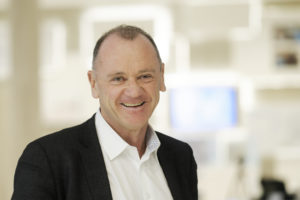An expert in the household appliance sector, François Terrasse worked for the German manufacturer BSH. After-sales service manager and then in charge of the circular economy, he took part in the projects launched by the public authorities: reparability index, repair fund and reusable parts. He discusses the future challenges for the sector and the major role of manufacturers in the implementation of this new circular economy. Meeting.
 Could you explain your mission within the BSH Group?
Could you explain your mission within the BSH Group?
I was the after-sales service manager for the BSH group, which includes many brands such as Bosch, Siemens and Gaggenau. We are among the most environmentally conscious manufacturers. So it made sense to get involved in the circular economy project. My mission is to accompany this major change in the repair sector. I have taken part in discussions within the committees created by the public authorities, which bring together manufacturers, repairers, wholesalers and players such as GIFAM and Ecosystem. We had a very fruitful exchange. The roadmap set by the public authorities allows for a pragmatic and realistic implementation. My role is to serve as a link to our BSH group. In the same day, I will participate in meetings in Paris, Brussels and Munich.
What is the circular economy in the household appliances sector?
It is a question of designing products that correspond to the consumer’s expectations while providing for their environmental circularity. Right from the design stage, we will make material and technological choices that will take into account the entire life of the product. We improve their repairability. The aim is to allow a device to evolve and have several users during its life. For the past ten years, we have been manufacturing the devices differently, for example, we will ensure the availability of spare parts. Moreover, the re-use part is a major topic. I am also working on parts from the circular economy, a provision of the law that will be in place for next year. The other areas of work are obviously the reparability index and the repair fund. France is very forward-thinking on these issues.
Is France ahead of its European neighbours?
Yes, France is in a way a pilot project for the circular economy at European level. The launch of the reparability index is a first! There is a global awareness of the impact of products on the environment and France is ahead of the curve. The measures of the European Green Deal, which sets out the EU’s climate ambition, are not yet in force. With the anti-waste law, we have succeeded in creating a legislative framework, the first part of which is already a reality. For the moment, in the field of household appliances, the washing machine has been chosen as a test product. The index will soon be applied to all devices.
How does BSH, which is a global group, integrate this French specificity?
The group is closely monitoring the development in France. I have daily exchanges with my European colleagues on the subject. We are very involved in the process and we are already preparing for the next step. I lead a working group of nine people who calculate the reparability index for all the references concerned by BSH. From marketing to the design office, all trades are involved in the project. In addition, the group is used to working differently in each country. Another French specificity is the structuring of repair in so-called technical stations. In other countries, we work mainly with our technicians.
The collaboration with Agoragroup and in particular its after-sales solution Agoraplus, allows you to better manage your after-sales service at European level?
Agoragroup is an indispensable strategic partner with an international intervention capacity. Their technological knowledge is becoming more and more specialized. I was on the board of Agora and could see the developments over the years. We have gone from a service structure to a major player that offers a unique service model, particularly for home repairs. The Agoserve solution accompanies the technician in the field. There is no equivalent with such vertical and robust performance. Today, Agoragroup’s development prospects go far beyond household appliances. The company does not seek profits, but aims to connect the maximum number of players with technological solutions in order to provide the most efficient after-sales service for the final customer: the consumer.
As a matter of fact, what will be the major changes for the consumer in the years to come?
The next part of the anti-waste law is the repair fund with Ecosytem as the main contractor. The price of the non-warranty repair will be reduced by 20%. Consumers will be able to take their appliances to certified repairers with the guarantee of a quality repair at a reduced cost. The criteria for labelling repairers are currently being defined. This measure encourages repair and enhances the value of the repair profession. By 2025, repairing will become a reflex. Attitudes will have changed, consumers will become aware that manufacturers and repairers are working every day to make appliances last. We all live on the same planet!



